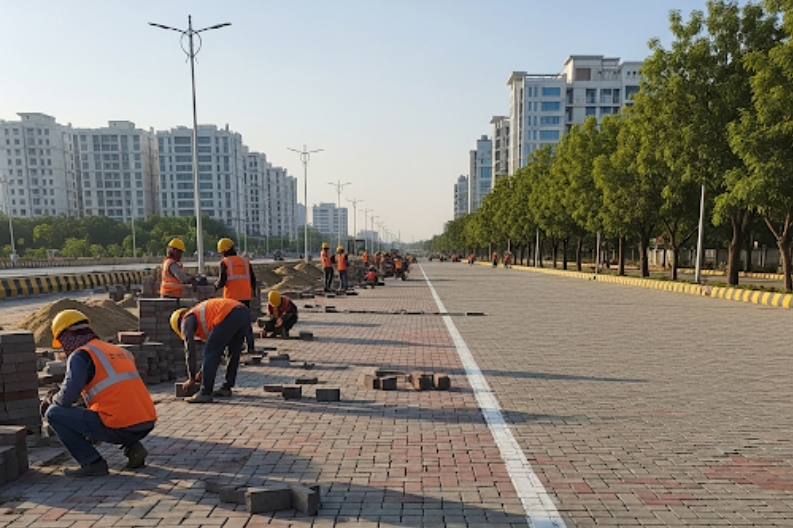With the current economic slowdown, not only Punjab, but every state in India has faced a serious impasse in its cash flow. The government has taken productive steps to ensure that every household in the state has a source of basic income to enrich the lives of the people living in it. The minimum wages in Punjab, as guided by the state and Central government, have increased over the years. In India, the rules of the minimum wages act were introduced a year after independence in 1948. Since then, at every regular interval, the government changes the minimum bar for wages depending on the socio-economical aspects.
Understanding the Minimum Wages Act better

To understand the terms better it is important to understand basic terms like skilled, unskilled, semi-skilled, and highly skilled labourers.
- Unskilled Labourer: An unskilled worker is a person with little or no experience in the working of the industry. His job is to perform simple operations with no judgement on the subject. The only feature that the employer expects from an unskilled labourer is occupational familiarity. The individual must be familiar with the dynamics of the factory or the workplace, on the basic level.
- Skilled Worker: A manager comes under the scope of a skilled labourer because he is an individual who carries out important duties with the help of his independent judgement skills. It is expected that a skilled worker has the complete knowledge of the trade he is appointed for.
- Semi-Skilled Worker: The semi-skilled labourers carry out certain routine responsibilities that require making little or no independent decisions. The scope of such a job is limited in nature.
- Highly Skilled Worker: A highly skilled worker supervises the job of skilled workers. He can do so because he has the knowledge and skills required to ensure the efficient working of the organization.
What is the Government doing?

New Zealand and Australia were the first countries in the world to prescribe national laws for minimum wages. These laws stressed on the clear minimum demarcation for the members of the labour union. Thus, starting a global revolution for the underpaid and overly hardworking labourers. Shifting the limelight to the Indian demographics of labourers, we see a colourful spectacle of varied minimum wages across the country. In comparison to the international market, India has the most complicated system of minimum wages. This is attributed to the varying demographics and geographical factors across the mainland. As of today, there are more than 1200 minimum wages prices under force in different regions of India.
As a state, Punjab is famous for its extensively flourishing agricultural industry. This being said, the land has been a constant epitome of power, influence, and economic gain for the people in this state. However, due to the exploitation of lands by corporates and rich people in the society, a wide majority of people in the state faced unemployment. The government ensured the implementation of the Punjab Village Common Lands 1961 regulation. According to this about 50 per cent of cultivable land is reserved for the socially disadvantaged people. This gave them the independence to grow their own food grains and feed their livestock, ultimately giving them financial freedom.
Mahatma Gandhi National Rural Employment Guarantee Act

The National Rural Employment Guarantee Act 2005 was renamed in the following years as the Mahatma Gandhi National Rural Employment Guarantee Act (MGNREGA). The government rolled out this act to ensure equal stability of the disadvantaged section of the society. Under this scheme, the rural labourers get a guarantee of 100 days of employment out of the 365 or 366 days in a year. On the employer’s end, this scheme compels them to spend 60 per cent of their capital to provide the minimum daily wages of their employees and 40 per cent for the material purchase.
Recently, the Punjab Cabinet gave a green signal to the Government Colleges in Patiala and Amritsar to create 550 new posts. This move may improve the statistics of employment in the state.
Minimum wages act

Wages include allowances of all kind and basic pay that an employer provides to his employee during his tenure of employment. The bonuses, overtime pay, and provident funds do not include in this definition. As per the regulations of this government scheme. The standard working hours for every worker is 48 hours and six days per week.
The minimum wages act Punjab govt implemented for the improvement for the economic status of the people living in the state, proves enough for the workers. The minimum wages in Punjab are decided on the basis of the inflation rate and economic growth of the country. Find the recent details of minimum wages defined for the people working in different jobs, as per the Minimum wages act.
| Daily (in Rs) | Monthly (in Rs) | |
| Skilled | 402.55 | 10453.83 |
| Semi-skilled | 368.05 | 9556.83 |
| Unskilled | 338.05 | 8776.83 |
| Highly Skilled | 442.25 | 11485.83 |
For Agriculture daily labourers, the minimum wage with the meal is Rs. 316.69 and without meals is Rs. 352.09.
Also know about Mohali Population.
Kaushal Vikas Yojana
The Pradhan Mantri Kaushal Vikas Yojana (PMKVY) is an active skill development scheme launched by the Central government of India in the year 2015. Through this scheme, the government aims at increasing the aptitude and efficiency of daily wage earners with the help of regular training. Based on the performance of the individual during the training process, they get monetary awards and rewards up to the limit of Rs. 8000. It runs in parallel to the minimum wages act Punjab government implemented for their citizens.
The main reason for unemployment in our country is not just the unavailability of a job, but the unavailability of trained professionals who have the skills required to perform a job. The Ministry of Skill Development and Entrepreneurship (MSDE) runs different training sessions across the state of Punjab under the Kaushal Vikas Yojana. More than 50 lacs individuals have gained employable skills through these sessions of training to date. As a college pass out, you don’t possess the skills that companies require for their growth. On that note, this scheme helps you learn such skills to make yourself employable.

Government
Strict Firecracker Rules in Mohali for Upcoming Festivals
The Mohali district in Punjab is taking strong steps to control firecracker usage during festivals.

ChatGPT Generated (Not a Real Image)
Strict firecracker rules in Mohali for upcoming festivals aim to protect public health and improve air quality during the festive season. The Mohali district administration in Punjab has taken strong steps to reduce pollution caused by fireworks. These measures will apply to popular celebrations such as Diwali, Guru Nanak Dev Ji’s Parkash Purab, Christmas, and New Year’s Eve to ensure safer and cleaner festivities for everyone.
The administration introduced these restrictions under Section 163 of the BNNS, directly banning the sale, use, and storage of traditional firecrackers. However, officials have allowed people to burst approved crackers only during specific hours.
Here are the permitted timings:
- Diwali: 8 PM to 10 PM
- Guru Nanak Dev Ji’s Parkash Purab (November 5): 4 AM to 5 AM and 9 PM to 10 PM
- Christmas (December 25-26): 11:55 PM to 12:30 AM
- New Year’s Eve (December 31, 2025 – January 1, 2026): 11:55 PM to 12:30 AM
District Magistrate Komal Mittal explained that Punjab has completely banned series or chain fireworks, also known as laris. These types of crackers release excessive smoke and noise, which seriously affect air quality and public health. Therefore, only green crackers, which are safer and less polluting, will be permitted.
Green crackers do not contain harmful elements like barium salts, mercury, antimony, or lead. They release fewer toxic gases and create lower noise levels. Moreover, only licensed sellers can trade these eco-friendly crackers. The administration believes this decision will encourage people to celebrate responsibly and help protect the environment at the same time.
To prevent illegal online sales, major e-commerce websites such as Amazon and Flipkart are strictly prohibited from accepting firecracker orders in Mohali. Authorities are continuously monitoring online activities to ensure full compliance with this order.
Meanwhile, the local police and the Pollution Control Department will jointly enforce these restrictions. They will actively check marketplaces and residential areas to stop violations. In addition, the Punjab Pollution Control Board (PPCB) will monitor air quality in different cities and towns. The PPCB will work according to the Central Pollution Control Board (CPCB) guidelines and pay special attention to non-attainment cities, where air quality consistently fails to meet government standards.
Officials pointed out that these restrictions fully align with the rulings of the Supreme Court of India and the National Green Tribunal (NGT). Because of this legal backing, the move carries both administrative and judicial support. It also reinforces the government’s ongoing mission to protect citizens’ health while maintaining environmental balance.
Anyone who violates these firecracker rules will face strict consequences. Offenders can be fined or even jailed under Section 15 of the Environment (Protection) Act, 1986, along with penalties under other environmental laws. The prohibitory orders will remain in effect from October 1, 2025, to January 2, 2026, covering the main festive period.
Environmental experts and health officials have welcomed this decision. They explained that during Diwali and winter, Punjab often experiences a sharp increase in air pollution due to smoke from fireworks and stubble burning. Therefore, these restrictions will likely help reduce harmful gases and dust particles in the atmosphere. Moreover, schools, NGOs, and local communities are promoting awareness campaigns about celebrating festivals with fewer crackers and more sustainable practices.
Ultimately, strict firecracker rules in Mohali for upcoming festivals reflect the Punjab government’s firm commitment to cleaner air and safer celebrations. With collective cooperation from citizens. These measures can create pollution-free festivities, protect public health, and ensure a healthier environment for future generations.
Government
Haryana Launches an Important Plan for a Greener Future
In a significant step towards protecting the environment, Haryana’s Chief Minister Nayab Singh Saini announced the State Environment Plan (SEP) 2025-26 on Tuesday.

ChatGPT Generated (Not a Real Image)
In a significant move for sustainability, Haryana launches an important plan with the introduction of the State Environment Plan (SEP) 2025-26. Announced on Tuesday by Chief Minister Nayab Singh Saini in Panchkula, this initiative aims to make Haryana a leader in environmental protection and future-ready development. The plan focuses on achieving Sustainable Development Goals (SDGs) with clear targets to improve living conditions across the state.
The SEP is more than just a framework. It includes a detailed study of Haryana’s environmental condition. The focus areas are agriculture, waste management, transport, industry, and pollution control.
The State Pollution Control Board worked with the Indian Green Service Development (IGSD) and the Energy and Resources Institute (TERI) to draft this plan. A key highlight is the report A Dual Strategy Sprint Towards Sustainability. It calls for reducing both carbon dioxide emissions and short-lived climate pollutants. This approach will improve air quality and aligns with regional efforts in Punjab.
Waste management forms another crucial part of the SEP. It introduces 13 Integrated Solid Waste Management Plants to tackle growing urban challenges in cities like Mohali and Chandigarh. The plan also emphasizes improving water and air quality, which are vital for public health and well-being.
Officials noted that every component of the SEP will help Haryana use resources wisely while promoting long-term sustainability. The initiative shows the state’s proactive stance against pressing issues such as pollution, waste, and resource depletion.
The timing of this plan is vital. Global awareness of environmental challenges is growing quickly. By using innovative solutions and involving both institutions and citizens, Haryana aims to become a model state for eco-friendly growth.
Chief Minister Saini’s vision for a greener Haryana is clear in this bold step. The SEP seeks to protect resources and inspire communities to adopt sustainable practices.
In conclusion, Haryana launches an important plan that acts as a blueprint for future growth rooted in environmental responsibility. With strong policies, organizational support, and citizen involvement, the state is paving the way for a healthier tomorrow.
Government
Haryana CM Announces New Paver Block Roads in Panchkula
Improving Roads in Panchkula
On Monday, Haryana’s Chief Minister, Nayab Singh Saini, made an important announcement.

Improving Roads in Panchkula
On Monday, Haryana CM Announces New Paver Block Roads as Chief Minister Nayab Singh Saini ordered the construction of new roads in Panchkula district. These roads will replace the old, dusty “kutcha” roads and benefit 19 villages in the hilly areas of Morni and Kalka.
Panchkula is about 20 kilometers from Chandigarh. This makes it an important link between Haryana and Punjab. The new roads will help make travel easier for many people living in the region.
Details of the Road Projects
The Chief Minister has directed that a total of 61 kilometers of roads be paved. Each of these roads will be 12 feet wide. This width will help ensure smooth traffic flow for both locals and visitors.
- The road upgrades include:
- Panipat-Safidon (41 km)
- Safidon-Jind (21.65 km)
- Saha Chowk-Panchkula-Yamunanagar (four-lane road)
- Saha Chowk-Kalpi
- Tohana-Ratia
These upgrades will not only make travel easier but also improve safety for everyone using the roads.
Additional Road Projects
Beyond the 61 kilometers of paver block roads, Saini has asked officials to speed up work on several more road projects in Panchkula. These include:
- Thapali Badisher-Koti (1.68 km)
- Pinjore Mallah-Mangniwala (1.20 km)
- Gobindpur-Thathar (5.35 km)
These projects aim to enhance connectivity in Panchkula and support the growing population.
Next Steps for the Construction
During a review meeting with officials from the public works and forest departments, Saini emphasized the need for timely action. He instructed that work should begin quickly after obtaining a no-objection certificate (NoC) from the forest department. This certificate is necessary for construction in areas with trees and wildlife.
Principal Secretary to the Chief Minister, Arun Gupta, and Additional Chief Secretary (PWD), Anurag Agarwal, were present at the meeting. They discussed strategies to ensure that the projects are completed efficiently and on time.
Background on Panchkula
Panchkula is not just another town. It is part of the larger region around Chandigarh, which is known to be one of the cleanest cities in India. Cleaner cities often produce better living conditions and infrastructure for nearby areas, like Panchkula. The development of new roads will help improve civic services and support the needs of residents.
The Impact of Better Roads
Better roads mean more than just smoother driving. They connect communities, help businesses grow, and make it easier for people to access education and healthcare. For the hilly areas of Morni and Kalka, these roads will make it easier for residents to travel to nearby towns and cities.
Local farmers can transport their goods more easily. This can lead to increased sales and better incomes. Students will also find it easier to reach schools and colleges. Parents will have less worry about how their children get to school.
The Future of Infrastructure in Haryana
The move to replace kutcha roads with paver blocks is part of a larger plan. The Haryana government is focusing on improving rural infrastructure. This effort aims to boost the local economy and improve the quality of life for people living in these areas.
As more projects like this are developed, the future looks bright for the communities in Haryana. Residents can look forward to better roads, stronger connections, and improved services.
Conclusion
In conclusion, Haryana CM Announces New Paver Block Roads, marking a positive step for Panchkula. The construction of 61 kilometers of new paver block roads will greatly benefit the region. With prompt action and good planning, these improvements will help transform the lives of many people living in the hilly areas of Morni and Kalka.
-

 Entertainment3 years ago
Entertainment3 years agoTop 15 Punjabi Models – Male and Female List
-

 City Guide3 years ago
City Guide3 years ago3B2 Mohali Market Shops: Discover 44 Hidden Gems
-

 Entertainment3 years ago
Entertainment3 years agoTop 11 Punjabi Comedians of All Time
-

 Jobs4 years ago
Jobs4 years agoTop 20 IT Companies in Mohali
-

 Food4 years ago
Food4 years ago11 Best Restaurants in Mohali You Must Visit
-

 Food3 years ago
Food3 years agoTop 15 Cafes in Mohali you must visit
-

 Property2 years ago
Property2 years agoWho Lives In Homeland Mohali: Punjabi Celebrities, Business People…
-

 Education2 years ago
Education2 years ago10 Famous Punjabi Writers With A Great Impact On The Literary World